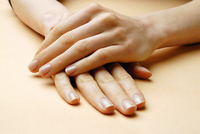Health experts point the accusing finger at nail bars
 Nail bars in the UK are risking the health of their customers by using a range of unregulated, harmful chemicals. Now one of the UK’s leading nail care specialists and a group of MP’s are calling for all nail bars to be forced to be controlled more effectively before it is too late.
Nail bars in the UK are risking the health of their customers by using a range of unregulated, harmful chemicals. Now one of the UK’s leading nail care specialists and a group of MP’s are calling for all nail bars to be forced to be controlled more effectively before it is too late.Industry spokesperson and MD of Nail-It! Phil Carroll says the most damaging treatment is having false acrylic nails fitted because there is no ‘glue’ available which is 100 per cent certain not to damage nails.
“We are dealing with an increasing number of cases – almost all of them women – with very badly damaged nails due to careless use of products being repeatedly applied to sensitive fingertips and nails,” says Carroll.
The main culprit is methyl methacrylate (MMA), a substance already banned in the US because of health concerns.
The chemical, a form of super glue, was used for cosmetic surgery and was originally developed for combat dressing stations in the Vietnam war.
The product is now used to apply fake nails and can cause an allergic skin reaction or permanent nail damage or loss in users.
Members of staff in nail salons are expected to wear protective gloves or masks when using the product although it is being applied directly to the client’s skin and nails. In the United States there is concern that long-term exposure to the chemical can lead to permanent respiratory and liver damage.
Some beauty salons are now turning their back on nail treatments because they have become concerned with the long term side effects. Zoe Stanton, a beautician working in London says: “Our salon has stopped offering nail treatments as we’ve seen what those chemicals do to our staff. It’s just not right that both beauticians and consumers are put at risk.”
“Here in the UK, salons are free to use such chemicals and aren’t obliged to tell customers of the risks. Surely it is the right of the consumer to know exactly what is being put on their skin and nails along with any potential risks of treatment.” says Carroll. “A reputable salon will not use destructive adhesives like MMA and will be happy to advise their clients about what chemicals are being used on their nails, along with any long term risks involved”
Kath Cousineau, a 53 year old housewife from Chester, started wearing acrylic nails about 4 years ago, but has now given up after she noticed how much her own nails and fingertips were suffering.
“No one told me how much damage they would cause,” she says. “After having them stuck on, I had to regularly see the manicurist to file down the natural nail, which still grows underneath, and when I eventually got sick of having acrylic nails, and had them professionally taken off, my own nails were horribly thin and white. It took a year for them to recover and to look and feel normal.”
In the UK, there are approximately 14,000* thousand nail bars and nail salons, which are frequented by women of all ages. Nail bars aren’t obliged to inform their customers of the potential side effects of any chemicals used in any treatments; “You basically go in at your own risk, says Phil Carroll.
“I feel strongly that the law should change so that the risks of the procedures offered at nail salons are fully explained,” says Kath Cousineau.
“With so many teenagers jumping on the trend, long term damage could be being caused without people knowing it. I only wanted to have lovely nails and be proud of them; instead I was in serious discomfort and ended up with weaker nails than I started out with.”
Kath is now using Nail-It - a natural paint-on product which has helped to repair the damage and strengthen her nails.
“A proper licensing regime for nail bars and beauty salons across the UK would protect customers, drive up standards and reward those businesses investing in training,” explains Carroll. “
Currently, nail bars don't come within the scope of the Local Government (Miscellaneous Provisions) Act 1982, and therefore cannot be subject to licensing.
Environmental health staff can give advice on the use of chemicals, but their only enforcement power comes through the Health and Safety at Work etc. Act 1974, which is relevant to employees, not to customers. Trading standards can respond to customer complaints, but that is all the protection offered to customers. Licensing outlets would mean that women and young girls could use nail bars and be confident that their nails were in good hands.”

